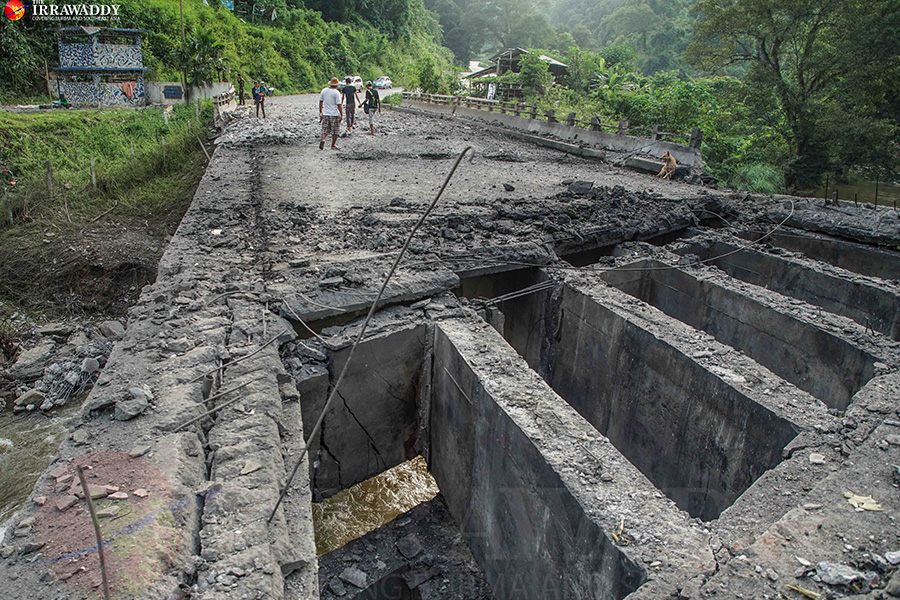CHIANG MAI, Thailand—Five civilians including three children were killed when mortar shells struck their homes in Kutkai Township’s Mawhit village in Shan State on Saturday.
The fighting erupted in Kutkai between the Myanmar military and the Brotherhood Alliance of three ethnic armed groups while the groups’ leaders were holding peace talks with the government in Keng Tung, eastern Shan State, on Saturday.
An 18-year-old woman and her 5-month-old daughter; and a 34-year-old woman and her son, 9, and daughter, 14, from Mawhit village, Kutkai Township in northern Shan State were killed by mortar shells and their homes were destroyed, according to Kutkai residents.
“Three of them died immediately from the shelling and two others died after arriving at a hospital in Kutkai,” said Daw Lum Nyoi, a Kutkai resident.
Three others were injured, of whom two were taken to Lashio Hospital.
“The sound of gunfire was heard since 7 a.m. in Kutkai Town, starting when we were about to take the children to school,” said Mai Mai, a Kutkai resident who is also a relief worker.
“Later we heard villagers died when mortar shells struck their homes in Mawhit village on the outskirts of Kutkai. The dead bodies and injured people were taken to Kutkai Hospital,” she told The Irrawaddy from the mortuary on Saturday.
Civilians have lived in fear amid shelling and fighting since the alliance renewed their attacks on Aug. 15.
It could not be confirmed which side fired the shells. Images of shrapnel posted by locals appeared to be of 60-mm rounds, which are used by both the military and rebel troops.
Military spokesman Brigadier-General Zaw Min Tun told The Irrawaddy that the ethnic armed groups launched two mortar attacks on Saturday, from 9:00-10:30 a.m and from 10:45-11:00 a.m., firing a total of 10 rounds.
He said, “Two or three mortar shells struck battalions and destroyed some buildings. We heard they struck civilian homes. But there are no [Myanmar] army casualties.”
He added, “Such attacks on the military and civilians undermine the peace talks. We can see clearly their dishonesty regarding the peace talks, and their exploitation of the talks. As long as they continue these destructive actions, the peace process won’t happen.”

Brig-Gen. Zaw Min Tun also told The Irrawaddy on Saturday afternoon that the military would extend its self-imposed ceasefire in parts of the country. “The Office of the Commander-in-Chief extends the truce in five military commands until Sept. 21, in order to continue the current peace negotiations led by the NRPC [National Reconciliation and Peace Center].”
Saturday’s talks in Keng Tung were the fourth between the government and the Northern Alliance (NA)—comprising the Kachin Independence Army, the Arakan Army, the Ta’ang National Liberation Army and the Myanmar National Democratic Alliance Army—since talks in Kunming, China on Feb. 25.
The government delegation is led by the vice chairman of the Peace Commission (PC), U Thein Zaw, and includes PC Secretary U Khin Zaw Oo, President’s Office Spokesman U Zaw Htay, other PC members and Shan State Security and Border Affairs Minister Colonel Hla Oo.
A joint statement released Saturday by the two sides said they discussed negotiating bilateral ceasefire agreements and the ceasing of fighting in the area, as well as signing the Nationwide Ceasefire Agreement (NCA) and the issue of internally displaced persons (IDPs). They also discussed troop deployments, ways to prevent further clashes and the date of the next round of talks. Both sides vowed to continue their cooperation to end the armed conflicts in the country.
The discussions were “heated and thorough,” according to U Zaw Htay.
The statement said both sides will meet again on Sept. 16-17, and will negotiate the venue in the meantime. The NA has proposed the venue as Panghseng, the capital of Wa, or somewhere in China, while the government has proposed Keng Tung, said U Zaw Htay, but the issue will be discussed further.
The statement added that discussions will continue with the military negotiation team on the issues of troop deployments and ending the fighting.
Regarding the attacks in northern Shan, Nyo Tun Aung, deputy chief of the Arakan Army, told reporters after the talks that, “We don’t do anything to harm our own people. We don’t kill our own people. All we can say now is we don’t kill civilians.”
He said Saturday’s talk were “good, and also we expected them to be good.”
U Zaw Htay, the President’s Office spokesman, told reporters at the press conference in Keng Tung following Saturday’s talks that the government also discussed the impact of fighting on the public, including civilian deaths such as those that occurred in Kutkai. “We discussed ways to reach strong bilateral ceasefire agreements, but we still need to discuss some parts further,” he said.
Government peace negotiators and Northern Alliance leaders met in Muse, northern Shan State on April 30 and in Mongla, eastern Shan State on June 30. Both occasions followed an extension by the military of its unilateral ceasefire in five military commands in Kachin and northern Shan states.
Htet Naing Zaw contributed to this report from Naypyitaw.
You may also like these stories:
Myanmar Peace Team, N. Alliance to Meet in Keng Tung on Aug. 31
Myanmar Military Denies Losing Troops in Clash with AA in Northern Rakhine
Rebels Blame Border Instability, Peace Breakdown on Myanmar Military
TNLA Destroys Bridge, Targets Myanmar Military Battalion in Shan State

















